Flexible scheme
JOHN CHERIAN
Member-countries agree to a phased transfer of responsibility to
Afghan forces before the withdrawal of troops in 2014.
Afghanistan was the major item on the agenda at the North Atlantic
Treaty Organization (NATO) summit held in Lisbon for two days from
November 18. It is no secret that the majority of NATO members want to
withdraw their troops at the earliest from that country. Public opinion
in their countries is strongly against the war in Afghanistan. Near the
summit venue, thousands of protesters shouted, "Peace, yes. NATO, no!"
|
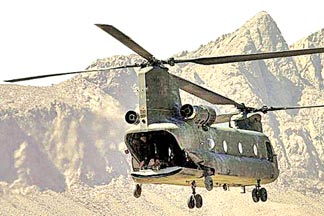
A helicopter flying over Afghanistan |
United States President Barack Obama and other senior heads of state
in the West had earlier in the year mentioned 2014 as the deadline for
the withdrawal of foreign troops from Afghanistan. But in recent months
Obama has had an apparent change of mind given the military facts on the
ground in the country.
Military surge
Despite his much-hyped military surge, the Taliban has held its
ground and seems to be in fact expanding its influence to areas where
its presence has been insignificant. To add to Obama's and NATO's
problems, President Hamid Karzai has once again become vocal in his
demand for a speedy withdrawal of foreign forces and a halt to the
targeting of civilians in NATO's counter-insurgency operations.
|
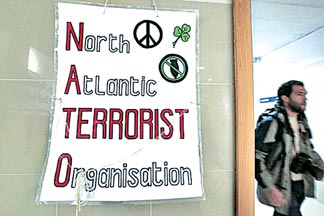
Protestors walking on the road showing their dislike to NATO
and its doings |
However, at the summit, despite their misgivings, America's European
partners publicly supported the Obama administration's latest game plan
in Afghanistan. They agreed to a phased transfer of responsibility to
the Afghan forces before starting the military withdrawal in 2014. At
the same time, NATO leaders issued a warning that the 2014 deadline was
not sacrosanct and was dependent on the Afghan Government making
sufficient progress in maintaining security.
Public opinion
Talking to the media at the end of the summit, Secretary General of
NATO Anders Fogh Rasmussen stated categorically that NATO forces would
stay on after the transition 'in a supporting role' in Afghanistan. In
order to mollify European public opinion, Rasmussen said that he did not
visualize NATO's International Security Assistance Force (ISAF) playing
a combat role in Afghanistan beyond 2014.
Many NATO member-countries have already withdrawn their troops from
Afghanistan. Others have insisted that they will be completely out of
the country by 2014. The US' closest ally, Britain, has said that the
last of its combat troops will be out by 2015. A long-term security
agreement between NATO and the Afghan Government was signed during the
summit. NATO officials have been saying for some time that a large
number of NATO troops will stay behind after 2014 to prop up the Karzai
Government and to train Afghan forces. "To put it simply, the Taliban or
anyone else who wants to wait us out, they can forget it. We will stay
as long as it takes to finish the job," Rasmussen told reporters.
|
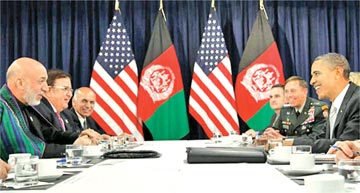
Afghan President Hamid Karzai with US President Barack Obama
at the NATO summit in Lisbon on November 20 |
His views may not find many takers in European capitals. Before the
Lisbon summit, the newly appointed French Defence Minister Alain Juppe
had said that Afghanistan was "a trap for all the parties involved
there".
Hand over areas
Juppe, who has served as Prime Minister earlier, also said that his
country was determined to hand over areas under its military control to
the Afghan forces as soon as it could. Nicolas Sarkozy Government has
indicated that it wants to remove all French troops from Afghanistan
before 2012 Presidential election. More than 70 percent of the French
public oppose war in Afghanistan.
NATO-Russia bonhomie
During the summit, NATO also signed an agreement with Russia to
expand the supply of war materials for NATO troops through an overland
route from Central Asia. It will be a setback for NATO if the
transportation of arms and supplies through the attack-prone Pakistani
route becomes untenable.
|
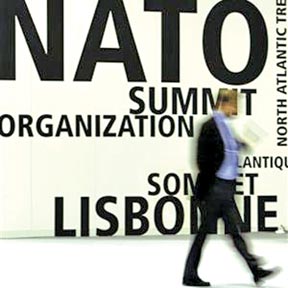
Protestors walking on the road showing their dislike to NATO
and its doings |
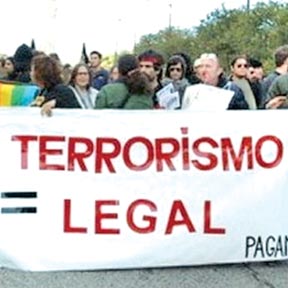
A person walking past one of the banners of the NATO summit |
The agreement illustrates the increased bonhomie between NATO and
Russia. Russian President Dmitry Medvedev was a special invitee to the
summit. Medvedev said that Russia was 'bolstering' its relationship with
NATO in order to build a 'strategic partnership'.
NATO was founded in 1949 in response to the alleged threat posed by
the USSR. Logically it should have disbanded after the collapse of the
Socialist bloc and the dissolution of the Warsaw Pact - the military
alliance of communist countries led by Moscow.
New enemies
At present, NATO is trying to stay relevant by conjuring up new
enemies all over the world. First it was the Balkans, now it is
Afghanistan. The next stop could be either Somalia or Sudan.
Obama, on his part, has defended the counter-insurgency tactics that
have led to the death of thousands of innocent civilians in Afghanistan.
While describing Karzai's criticism of civilian deaths "as entirely
legitimate", he said that the Afghan President should also understand
that US troops were being shot at and that they 'needed to protect
themselves'.
Obama, however, expressed confidence that the US would be able to
start downsizing its troops by July 2011 as he had publicly pledged. "We
are in a better place now than we were a year ago," he said. But he also
warned that "making progress between now and next summer was the key".
US Defence Secretary Robert Gates has said that only a fraction of
the U.S. troops will be left behind in 2014 and that they "would be in a
train-and-advice role" of the kind that the US has taken on in Iraq.
More than 50,000 US troops still remain in Iraq. Besides, the US has
constructed huge military bases in Iraq. Its aim is to ensure permanent
military occupation of both Iraq and Afghanistan for long-term strategic
reasons.Head of British Armed Forces General David Richards recently
said that US/NATO troops might have to stay in Afghanistan for the next
30 to 40 years. -The Hindu |



